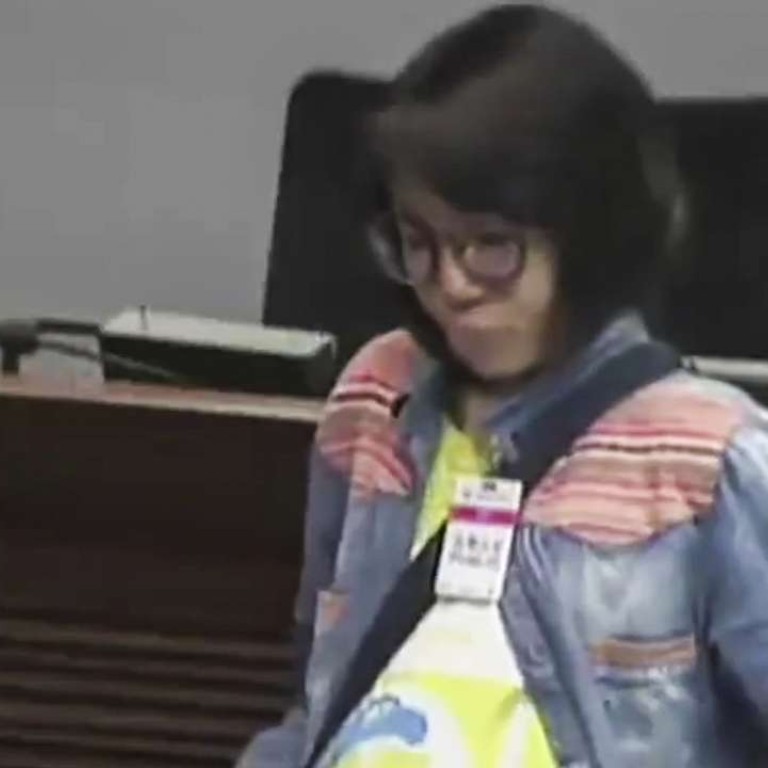
Hong Kong single mother with rare genetic disease dies following emotional appeal to lawmakers for drug subsidies
Group confirms her death, which came just over a week after she called on public officials to subsidise expensive drug to treat tuberous sclerosis complex
A Hong Kong woman with a rare genetic disease has died, just over a week after she told lawmakers that she “didn’t want to die” during her appeal to get a new but expensive medication subsidised.
A patients’ group has confirmed with the Post on Saturday that single mother Chi Yin-lan, 36, died a week ago, leaving behind a 13-year-old daughter who inherited the same condition.
On April 11, Chi attended a Legislative Council meeting and urged public officials to subsidise the use of an expensive drug to treat tuberous sclerosis complex (TSC), which causes tumours to grow in vital organs such as the brain and kidneys.
The medicine, which costs around HK$20,000 a month, was not listed under the Drug Formulary of public hospitals – meaning it was not a standard drug subsidised by the government.
However, the drug is expected to be subsidised for certain cancers in July under the Samaritan Fund, which was set up so certain medications would be affordable for low-income families.
Chi’s death has sparked a public debate over whether more public resources should be used on such patients to give them a chance at improving their condition.
“My belly is so big that everyone thinks I am a pregnant woman, but I am not carrying a baby,” Chi said during the meeting, standing up to show her enlarged waistline.
“This sickness has left me with many tumours in my stomach, and I am constantly worried about them exploding in my body.
“I do not want to die. I am just in my 30s; I am not willing to die yet. Please give me a chance.”
The drug – everolimus (Afinitor) – is an oral agent originally developed to treat cancer but last year, researchers found that it also significantly reduced the frequencies of seizures in TSC patients.
Chi, a single mother who depended on financial help from the government, could not afford the medicine.
The Hong Kong Alliance for Rare Diseases, a patients’ rights group which announced Chi’s death on Friday, said it was regrettable that Chi did not live long enough to try the new drug – which would be available under the Samaritan Fund once approved by an expert panel, according to the Hospital Authority.
But the group hoped Chi’s daughter could benefit from the drug.
The girl’s condition was serious and she suffered frequent seizures, according to Chi, who did not realise her condition was genetic before her daughter’s birth.
The alliance also called on the government to expand the drug coverage. It said that besides the drug for TSC, there were some other ultra-expensive ones to treat uncommon disorders not listed as standard drugs or available under a safety net.
“A human life is priceless – you cannot put a price tag on it,” said Democratic Party lawmaker Lam Cheuk-ting, who attended the Legco meeting. “This is not the way Hong Kong should go. No one should be denied treatment because of economic concerns, especially when we have hundreds of billions of fiscal reserves. This is inhumane.”
A Food and Health Bureau spokesman said there was a mechanism to ensure patients have access to cost-effective drugs of proven safety and efficacy levels.
The mechanism is underpinned by core values including evidence-based medical practice, rational use of public resources, opportunity cost and so on, he said.
The government has allocated an additional annual sum amounting to HK$75 million to public hospitals – to be given in phases – to meet the increasing demand for ultra-expensive drug treatments for uncommon disorders, the spokesman added.
The total drug consumption expenditure of the city’s public hospitals doubled from HK$2.19 billion in
2005-06 to HK$4.57 billion in 2015-16, representing about 8.3 per cent of the authority’s total expenditure.
There are thought to be more than 7,000 rare diseases collectively affecting 1 in 15 people worldwide, though “rare disease” has no common global definition.
In the US, they are defined as diseases afflicting fewer than 200,000 people in the country. In the European Union, they are those affecting fewer than five people in every 10,000.
The Hong Kong government has no definition or count of rare diseases locally, but the alliance estimated there are around 7,500 rare disease patients in the city.

